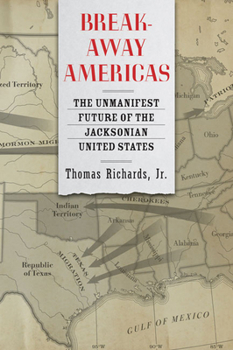Breakaway Americas: The Unmanifest Future of the Jacksonian United States
Select Format
Select Condition 
Book Overview
A reinterpretation of a key moment in the political history of the United States--and of the Americans who sought to decouple American ideals from US territory.
Published in Cooperation with the William P. Clements Center for Southwest Studies, Southern Methodist University
Most Americans know that the state of Texas was once the Republic of Texas--an independent sovereign state that existed from 1836 until its annexation by the United States in 1846. But few are aware that thousands of Americans, inspired by Texas, tried to establish additional sovereign states outside the borders of the early American republic. In Breakaway Americas, Thomas Richards, Jr., examines six such attempts and the groups that supported them: "patriots" who attempted to overthrow British rule in Canada; post-removal Cherokees in Indian Territory; Mormons first in Illinois and then the Salt Lake Valley; Anglo-American overland immigrants in both Mexican California and Oregon; and, of course, Anglo-Americans in Texas.
Though their goals and methods varied, Richards argues that these groups had a common mindset: they were not expansionists. Instead, they hoped to form new, independent republics based on the "American values" that they felt were no longer recognized in the United States: land ownership, a strict racial hierarchy, and masculinity.
Exposing nineteenth-century Americans' lack of allegiance to their country, which at the time was plagued with economic depression, social disorder, and increasing sectional tension, Richards points us toward a new understanding of American identity and Americans as a people untethered from the United States as a country. Through its wide focus on a diverse array of American political practices and ideologies, Breakaway Americas will appeal to anyone interested in the Jacksonian United States, US politics, American identity, and the unpredictable nature of history.
Related Subjects
History




